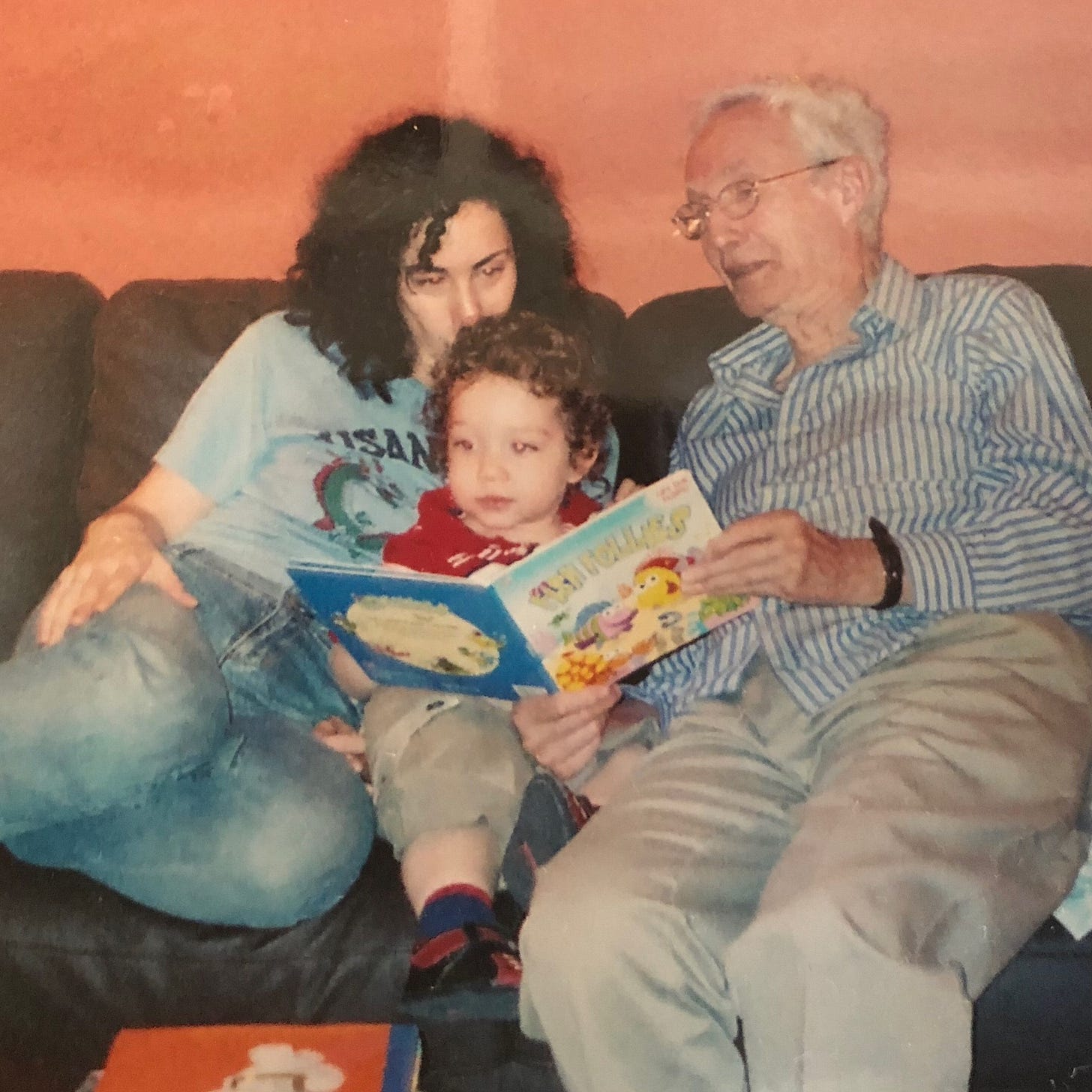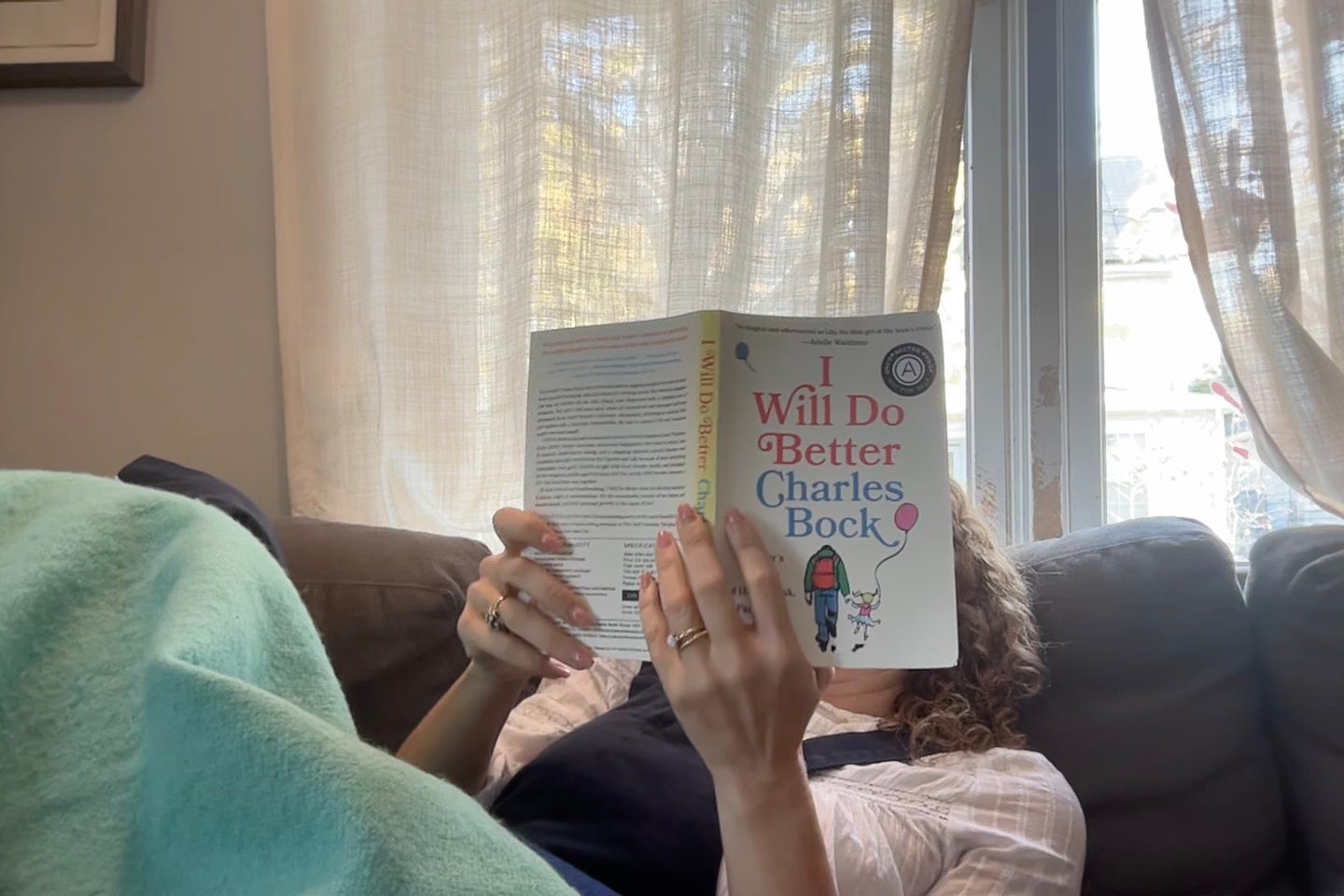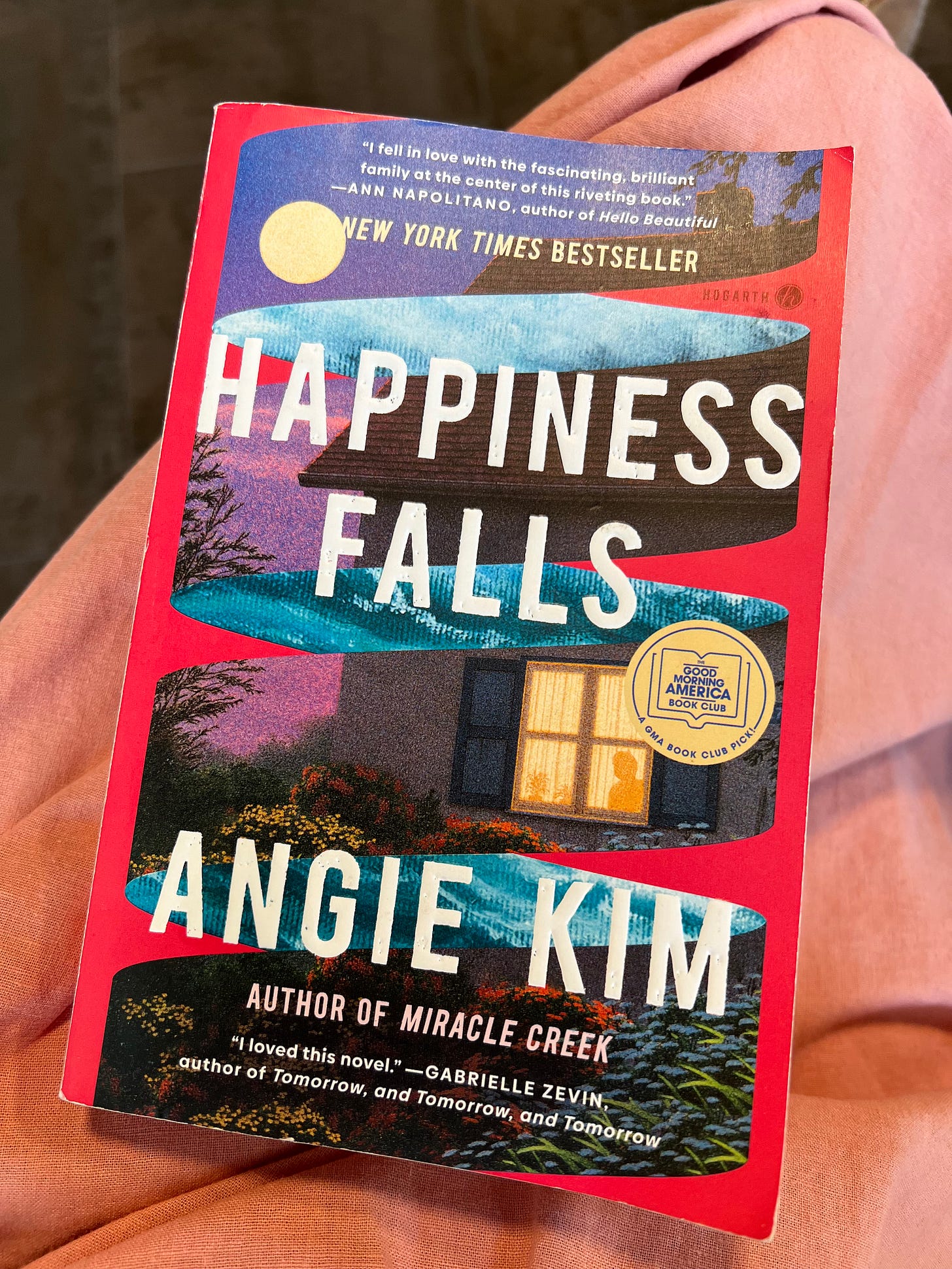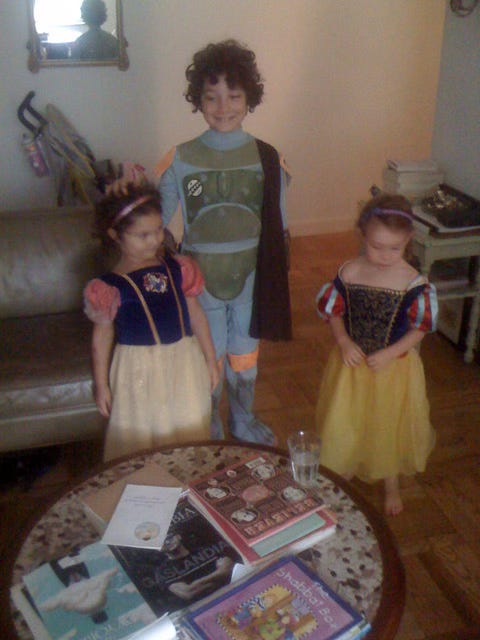A Life in Books (and other Wonderful Things) with Joanna Rakoff
Why do we read? That's a real question. Seriously, why?
Hello Beyonders!
I adore Joanna’s column this month. I’ve been walking around for days now pondering why do I read? I’m guessing you’re going to end up pondering this, too! Lucky for us, Joanna’s offers some fantastic books to help us sort it through. Plus some cool podcasts I hadn’t heard of before but are now in my line up. Thanks, Joanna! And thank you, dear Beyonders, for being here. Enjoy! As always, I look forward to digging into your comments!
xJane

A few months ago, my mother-in-law talked to me about her reading habits: “The world is so terrible right now,” she said, amiably. “And I just want to escape it. So I tend to read James Patterson and that kind of things. Easy reading. Reading I don’t have to think too much about. You know.”
Though her sentiment is hardly unusual–how many times have you heard someone express something similar?--I couldn’t stop thinking about it in the days and weeks that followed. Because she touched on a question that sometimes consumes me:
Why do we read?
Have you ever thought about this?
As a kid, I read constantly, every second I wasn’t in school or riding bikes with friends or unenthusiastically practicing cello. I read on car rides–despite my mother warning me that I’d throw up–and at the dinner table, until I was told to stop, and even tried to read while showering, leading to a hefty library fine. As an adult, I’ve built up a standard narrative around this: I was one of those dorky kids with my nose always in a book! I was bullied, so I escaped into fictional worlds! I had no friends so I found friends in books! I was a quasi-only child, and lonely, so I found siblings in books! You know the drill.
But if I’m honest–with myself and with you–I’m not sure any of that is true. I wasn’t, not really, trying to escape my life–which wasn’t so bad–or my lame town or the messed up Reagan-era U.S. or the constant threat of nuclear war drilled into kids during the Cold War. I was trying to enter it more deeply. To understand it. All of it. To forge greater connections to it, all of it. To feel everything more intensely.
Because isn’t that what reading does? No matter what you choose to read? I’ve never read a James Patterson book–should I?--but doesn’t anything you read make you think, make you feel, make you see the world, and yourself slightly differently? Even if you think it’s inauthentic, poorly written drivel? This is a real question. I really want to know what you think. And I also want to know: Why do you read? Or why do you think you read? Please take a moment and tell me in the comments.
Over the past month, I’ve read slightly fewer books–and more essays, articles, etc.--than usual, in part because I was waylaid by this brutal new covid variant and for about two weeks could barely do anything, and in part because I’ve been consumed by the state of the world–the upcoming election, the situation in the Middle East–but in part, too, because I’ve been in a state of feeling too much, of walking through my days in what I think of as my “sponge state” or, less happily, my “open wound state,” in which I seem to absorb the waves of emotion emanating from everyone around me. I often feel this way in the fall, when my kids return to school–as does my husband, a professor and dean at MIT–and our household undergoes, let’s say, a vibe shift. The four of them–I have three kids–are all out in the world, in new classes, meeting new people, taking on new projects, and I am at home, trying to return to my writer self, rather than, I guess, my summer self, who spends most of my time with family. This year, that return means writing more and reading a bit less. But here’s what I’ve loved:
Happiness Falls, Angie Kim
If you’ve talked to me in the past eight weeks, chances are, I rambled on and on about this perfectly narrated, ingeniously plotted novel. Set in June 2020, with the world in lockdown, Happiness Falls follows a suburban family from the moment the father–a stay-at-home dad to his college-age twins, Maya and John, and fourteen-year-old Eugene–simply doesn’t come home from a morning walk with Eugene, who has both autism and the lesser-known Angelman syndrome. Because Eugene cannot speak, he cannot explain what happened, and a detective’s attempt to strongarm him into providing information leads to a cascade of events that utterly upend the family’s understanding of the world. Narrated with wry wit by Maya—whose scientific, analytic attention to detail sometimes drives her family mad—this novel left me, like Kim’s characters, viewing the world from a decidedly different angle, and asking complicated questions about the value placed on speech in Western culture and so much more. I’m trying very hard not to give too much a way here, but trust me: You need to read this asap.

The Wedding People, Alison Espach
Oh gosh, I loved, loved this novel and can’t stop thinking about it. The setup is this: A woman, in early middle age, arrives at a luxurious hotel in Newport, dressed in a silk evening gown–with no luggage other than a handbag–and checks in, for just one night, to their biggest suite. Her goal: To kill herself. But she’s met with an unexpected obstacle: The rest of the hotel is booked by guests of a million dollar wedding. The bride, at first, presumes the interloper to be a guest, as well, and befriends her, and by the time the truth comes out, the two have forged an odd, delightful bond. This precis, however, in no way conveys the utter magic of this novel, the pleasures of which lie in Espach’s delightful, all-knowing omniscient narrator, who perfectly deploys observations about contemporary life, and regards each and every character with the precise dose of empathy and reason. Fellow fans of Victorian fiction: You will love the sly ways Espach plays with the marriage plot. Everyone else: You will simply love it.
Summer Fridays, Suzanne Rindell
A year or so ago, I wrote an essay about what I call “Assistant Lit,” for which I read and loved Suzanne Rindell’s excellent 2014 novel Three-Martini Lunch, set in the racially and ethnically divided–or, okay, racist and anti-semitic–world of 1950s publishing. And so I was excited to read Rindell’s new novel, Summer Fridays, also set in the publishing world, but in my era, the Nineties. This one also looks at class divides in publishing–an industry famous for salaries so low they require parental supplementation, second jobs, or, most famously, trust funds–but finds Rindell in a more wistful, buoyant mode, as she follows Sawyer–her assistant heroine–over an eventful summer, as she questions the staid direction in which her life is headed: Marriage to her lawyer boyfriend, etc. Real talk: If you liked My Salinger Year, you will likely devour this novel, as the two have a lot of overlap: like, er, Young Joanna, Sawyer is a poet, who begins publishing during her assistant year and has a jaded, cynical boss and a jerky boyfriend. Stylistically, the two are quite different, but still. I couldn’t put it down and found myself yearning for the days before smart phones, when a person could get lost on the streets of New York, thinking her own thoughts, untethered to any demands other than those of her mind.

I Will Do Better: A Father’s Memoir of Heartbreak, Parenting, and Love, Charles Bock
It’s always a little weird to read a friend’s memoir, particularly if you lived through the period chronicled with them. Thus, I put off reading I Will Do Better in part because I remember, all too well, the moment Charles told me—in the kitchen of the shared writers’ space at which we both wrote our second books—that his wife, Diana, had died the night before, after a two-year battle with cancer. This wrenching—but also very funny—memoir chronicles the two years that followed, when he struggled to tend to their three-year-old daughter, Lily, without any safety net, financial or otherwise, and very little family support. Charles vividly captures both the joys and struggles that define early parenthood–the playground scenes made me laugh out loud–and the exhausting specifics of tending to Lily, traumatized and bereft, while ferociously mourning his kind, adventurous, generous wife. But perhaps what defines this book—other than its urgent, singular style and tone—is its intense intimacy, as he struggles to figure out how to be a father—and a human—in this new, lonely reality.
COME SEE ME!
I have a couple of public appearances tied to new essays in anthologies. Come and say hi!
Los Angeles: Sunday, November 3, 6pm, Zibby’s Bookshop. The launch party for On Being Jewish Now, a collection of essays focused on living in the U.S. against a backdrop of rising antisemitism.
Hartford: Friday, November 15, 9:30am, Mandell JCC of Greater Hartford. Reading from and discussing my On Being Jewish Now essay.
READING NOW
More on this next month, but I’m basically holding my breath through Post-Traumatic, Chantal V. Johnson’s great novel of New York, and Madeleine Watts’ Didion-esque Elegy, Southwest, both fueled by a dark, foreboding feeling that mirrors my own pre-election anxiety.
OTHER GOOD THINGS, PODCAST EDITION
My friend Laura Zigman suggested The Just-Enough Family back in August when I had a long drive after dropping my son at college and after listening to the first two episodes found myself texting it to a half dozen friends saying, “You must listen to this!” Hosted by fantastic New Yorker staffer Ariel Levy, this short, captivating series delves into the making and unmaking of one family’s fortune: The Steinbergs, who regularly made headlines in the 1980s for ethically-dodgy financial moves and parties lavish beyond your wildest imaginings. Levy is such a great interviewer and an equally delightful host, and I spent a lot of time sitting in my car, unable to stop listening.
Laura also suggested the third season of Dana Goodyear’s podcast Lost Hills, which goes deep into the deaths of a mother and young son, categorized as a murder by the police, but believed to be an accident by the surviving members of the family, who remain loyal to the murderer: the woman’s husband. But this is also an investigation of the culture of Malibu in the 1970s and so, so much more. Despite this, I still wanted more: A few more episodes, Dana, please!
There are a lot of excellent literary podcasts out there, but my favorite is Burned by Books, hosted by Chris Holmes—a literature professor at Ithaca College—and focused on tomes “that change the way we think about stories.” Holmes has interviewed greats like Jennifer Egan, Katie Kitamura, and Alice Elliott Dark, but also talks with many, many emerging writers, and I love the way he goes so, so deep into craft, and the extreme passion that underlies each interview. He’s introduced me to many favorite novels, like The Rabbit Hutch, and made me see favorite writers—like Egan—quite differently. (Yes, he’s interviewed me…)
That’s it for now! But I’ll be back in two weeks with what I’m calling a Mini Column, in which I answer your questions about that big New York Times list released this summer, as many of you, I know, are trying either to read your way through it or figure out which titles you should prioritize.
If you missed my September column, you can find it here:
And, as always, I am truly grateful to you for spending a moment with me each month. Your comments (and hearts!) truly make my day and also help me figure out future columns! So please keep ‘em coming! Tell me what you’re reading and your thoughts on why we read. Here are a few favorites from September:
“Thank you! Totally trust your recommendations as if a life-long friend insisted with all the reasons they knew would compel me...”
“Just subscribed recently - loving your take on the books you feature. I'm trying to find more time to read - investing in myself.”
“I was an indie bookseller years ago and I understand the wisdom of books and the joy of sharing titles with other readers.”









Took notes on this one!! I’ve been searching for a new podcast and Burned By Books sounds like the perfect pod to jump into. Thank you!
I loved reading this! I relate so deeply to Rakoff's desire to read, not to escape—I also read obsessively as a kid!—but to feel more deeply curious and integrated with the world, and newly aware of all its possibilities. The intense emotions I get from a novel often make life itself more meaningful.
It reminds me a bit of this passage from Proust: "Real life, life finally uncovered and clarified, the only life in consequence lived to the full, is literature. Life in this sense dwells within all ordinary people as much as in the artist…It is only through art that we can escape from ourselves and know how another person sees a universe which is not the same as our own and whose landscapes would otherwise have remained…unknown."
Such a pleasure to read the mini book reviews, too—very intrigued by Espach's The Wedding People now! This was a wonderful column to read on a peaceful Saturday morning.